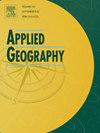从价值链到价值网络:印度东喜马拉雅地区猕猴桃行业对当地发展的启示
IF 5.4
2区 地球科学
Q1 GEOGRAPHY
引用次数: 0
摘要
价值链往往是促进地方发展的话语的一部分,包括在农业社会的背景下。最近,从价值链概念延伸而来的价值网络的概念也越来越重要,因为它能够帮助导航参与价值共同创造、交换和获取过程的各种实体的相互联系。我们看到了将价值网络观点应用于促进地方发展的机会,特别是在社区依赖农业和相关活动的偏远农村环境中。本研究以印度东喜马拉雅地区新兴的猕猴桃生产行业为例,结合传统价值链和价值网络的视角进行分析。我们的研究主要基于使用不同工具和技术从研究区域的猕猴桃部门的各个利益相关者收集的原始数据。我们首先进行价值链映射和分析,讨论价值链升级的机会。随后,我们批判性地评估价值(经济和非经济)是如何在确定的价值网络中共同创造和捕获的。当与线性价值链视角并列时,价值网络视角为我们提供了更清晰的视角,让我们更清楚地了解更多参与者所扮演的角色,以及他们在共同创造价值中的相互联系。这些行动者相互作用的方式导致了网络中动态能力和能力的发展,促进了弹性,并在当地干预的基础上描述了当地经济系统的发展特征。本文章由计算机程序翻译,如有差异,请以英文原文为准。
From value chain to value networks: Inferences for local development from the Kiwifruit sector in Eastern Himalayan Region, India
Value chains have often been a part of the discourse on promoting local development, including in the context of agrarian societies. Lately, the idea of value networks, which is extended from the concept of value chain, is also gaining importance due to its ability to help navigate through the interconnectedness of various entities involved in the process of value co-creation, exchange, and capture. We see an opportunity to apply the value network perspective in furthering the discourse on local development, especially in remote rural contexts where the communities depend on agriculture and allied activities. In this study, we consider the case of the emerging kiwi production sector in the Eastern Himalayan Region of India and analyze it by combining the traditional value chain and the value network perspectives. Our study is mainly based on primary data collected using different tools and techniques from various stakeholders of the kiwifruit sector in the study region. We first conduct a value chain mapping and analysis to discuss the value chain upgrading opportunities. Subsequently, we critically appraise how value (economic and non-economic) is co-created and captured in the identified value network. When juxtaposed with the linear value chain perspective, the value network perspective provided us with greater clarity on the role played by a larger set of actors and their interconnectedness in co-creating value. These actors interact in ways that lead to the development of dynamic capabilities and competencies in the network, promoting resilience and characterizing the development of the local economic system based on local interventions.
求助全文
通过发布文献求助,成功后即可免费获取论文全文。
去求助
来源期刊

Applied Geography
GEOGRAPHY-
CiteScore
8.00
自引率
2.00%
发文量
134
期刊介绍:
Applied Geography is a journal devoted to the publication of research which utilizes geographic approaches (human, physical, nature-society and GIScience) to resolve human problems that have a spatial dimension. These problems may be related to the assessment, management and allocation of the world physical and/or human resources. The underlying rationale of the journal is that only through a clear understanding of the relevant societal, physical, and coupled natural-humans systems can we resolve such problems. Papers are invited on any theme involving the application of geographical theory and methodology in the resolution of human problems.
 求助内容:
求助内容: 应助结果提醒方式:
应助结果提醒方式:


